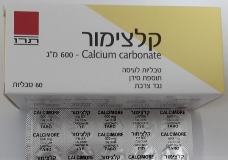Quest for the right Drug

קלצימור CALCIMORE (CALCIUM CARBONATE)
תרופה במרשם
תרופה בסל
נרקוטיקה
ציטוטוקסיקה
צורת מתן:
פומי : PER OS
צורת מינון:
טבליות לעיסות : CHEWABLE TABLETS
עלון לרופא
מינוניםPosology התוויות
Indications תופעות לוואי
Adverse reactions התוויות נגד
Contraindications אינטראקציות
Interactions מינון יתר
Overdose הריון/הנקה
Pregnancy & Lactation אוכלוסיות מיוחדות
Special populations תכונות פרמקולוגיות
Pharmacological properties מידע רוקחי
Pharmaceutical particulars אזהרת שימוש
Special Warning עלון לרופא
Physicians Leaflet
Overdose : מינון יתר
4.9. Overdose Overdose can lead to hypercalcaemia. Symptoms of hypercalcaemia may include anorexia, thirst, nausea, vomiting, constipation, abdominal pain, muscle weakness, fatigue, mental disturbances, polydipsia, polyuria, bone pain, nephrocalcinosis, nephrolithiasis and in severe cases, cardiac arrhythmias. Extreme hypercalcaemia may result in coma and death. Persistently high calcium levels may lead to irreversible renal damage and soft tissue calcification. Milk-alkali syndrome may still occur in patients who ingest large amounts of calcium and absorbable alkali. It is not uncommon as a cause of hypercalcaemia requiring hospitalisation. The syndrome has also been reported in a patient taking recommended doses of antacids containing calcium carbonate for chronic epigastric discomfort, and in a pregnant woman taking high, but not grossly excessive, doses of calcium (about 3 g of elemental calcium daily). Metastatic calcification can develop. Treatment of hypercalcaemia: The treatment with calcium must be discontinued. Treatment with thiazide diuretics, lithium, vitamin A, vitamin D and cardiac glycosides must also be discontinued. Treatment: rehydration, and, according to severity of hypercalcaemia, isolated or combined treatment with loop diuretics, bisphosphonates, calcitonin and corticosteroids should be considered. Serum electrolytes (if necessary with intravenous 0.9% sodium chloride), renal function and diuresis must be monitored. In severe cases, ECG and CVP should be followed.

שימוש לפי פנקס קופ''ח כללית 1994
Hypocalcemia, hyperphosphatemia, hyperacidity
תאריך הכללה מקורי בסל
01/01/1995
הגבלות
תרופה שאושרה לשימוש כללי בקופ'ח
מידע נוסף
